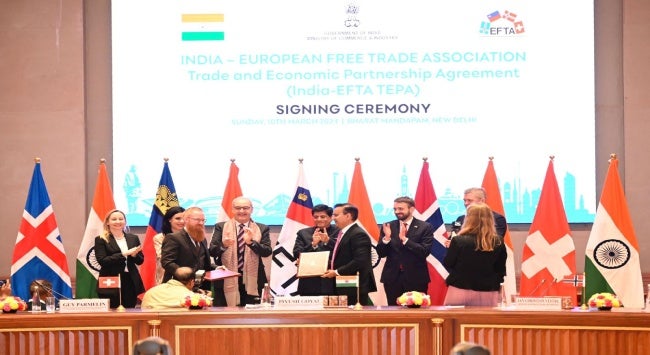Summary
India is shedding its traditional inhibition of incorporating labour standards in its free trade agreements (FTAs). This is evident from the latest FTA it has signed with the European Free Trade Association and the supply chain agreement of the Indo-Pacific Economic Framework that it has ratified.
India signed a free trade agreement (FTA) with the European Free Trade Association (EFTA) countries on 10 March 2024. The EFTA members include Iceland, Liechtenstein, Norway and Switzerland. The Agreement was concluded after more than 15 years of negotiations. Its successful conclusion raises hopes of a similar conclusion for India’s ongoing FTA talks with the European Union (EU) and the United Kingdom.
Apart from being India’s first ‘European’ FTA, the agreement is significant as it contains specific provisions on labour and environmental standards. India has been uncomfortable negotiating these subjects in its FTAs. The FTA with the EFTA marks a distinct shift in India’s perspective.
In the FTA, Chapter 11 contains provisions on labour and environmental standards. Titled ‘Trade and Sustainable Development’, the chapter commits to the effective enforcement of environment and labour laws by the members of the FTA. In this context, it clarifies that the members do not intend to harmonise their labour and environment standards. From an Indian perspective, therefore, while committing to enforcing domestic labour laws, it will not be required to bring the rules closer to those of the EFTA members. Such efforts will invite domestic resistance from several interest groups – a possibility that India would want to avoid.
The chapter also mentions that the members will implement their respective labour laws in a manner that will not adversely impact trade between them and that the laws will not be used for protectionist purposes. This implies that domestic labour standards will not be used for restricting imports from other members. India would interpret this as a commitment from the other EFTA members that they would not cite their arguably higher domestic labour standards for restricting labour-intensive exports from India. The assurance is important for maintaining the comparative advantages of Indian exports in the EFTA markets. The chapter specifically mentions that “[the] Parties note that their comparative advantage should in no way be called into question”.
The reference to comparative advantage is unique and interesting and works in India’s favour. India and several other developing countries have for long argued that exogenously imposed strong labour standards can erode their comparative advantages in labour-intensive production. The imposition of high minimum wages, for example, can reduce comparative advantages of Indian producers who employ labour at cheaper costs due to its greater local supply. From an Indian perspective again, refraining from questioning comparative advantage in the use of labour should suggest that labour standards in the FTA would not lead to future demands for parity in wage rates between India and the EFTA members.
While these provisions definitely safeguard India’s interests, the eventual implications of the labour standards on comparative advantage and productivity will depend on the extent to which members uphold the International Labour Organisation’s (ILO) labour rights, such as the elimination of forced or compulsory labour, child labour and discrimination in employment; ensure a safe and healthy working environment; and freedom of association and right to collective bargaining. The chapter is explicit and clear in its provisions in this regard.
The FTA with the EFTA is not the first multi-country rules framework where India has committed to upholding the ILO’s labour rights. It has also done so at the Indo-Pacific Economic Framework for Prosperity (IPEF).
India has not joined negotiations in Pillar 1 of the IPEF that is discussing trade rules. However, it has engaged closely with the other three pillars – resilient supply chains, clean economy and fair economy. Among these, the Supply Chain Agreement came into force on 24 February 2024. India’s proactivity in this regard has been visible from it being one of the first five members of the group, along with the United States, Fiji, Japan and Singapore, to ratify the agreement to enable it to come into force.
The Supply Chain Agreement commits the members to uphold the same labour rights of the ILO as Chapter 11 of the FTA with the EFTA. It also sets up the IPEF Labour Rights Advisory Board to ensure the effective enforcement of labour rights. The agreement further provides for the addressing of labour rights inconsistencies among the members by establishing a reporting mechanism for tracking these inconsistencies.
Compared with the FTA with the EFTA, the IPEF supply chain rules are more stringent in ensuring that the members implement labour rights in a uniform manner and are held accountable for not doing so. The fact that India ratified the agreement, notwithstanding the stringency, indicates its new-found inclination to not shy away from committing to labour rights in regional rules frameworks. The same inclination has been reflected in its commitments to the FTA with the EFTA.
. . . . .
Dr Amitendu Palit is a Senior Research Fellow and Research Lead (Trade and Economics) at the Institute of South Asian Studies (ISAS), an autonomous research institute at the National University of Singapore (NUS). He can be contacted at isasap@nus.edu.sg. The author bears full responsibility for the facts cited and opinions expressed in this paper.
Pic Credit: EFTAsecretariat Twitter Account
-
 More From :
More From :
-
 Tags :
Tags :
-
 Download PDF
Download PDF



